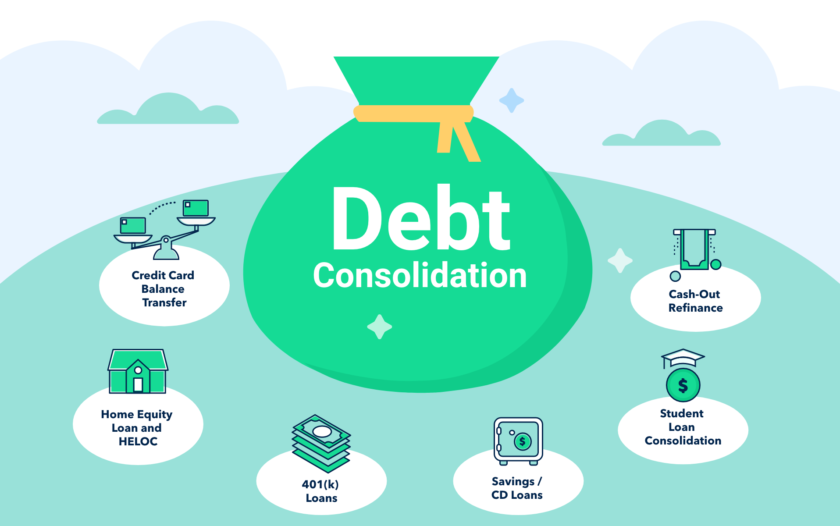Debt Consolidation Loans
Debt Consolidation Loans
Blog Article

Navigating Debt Relief: Debt Management Plans vs. Debt Consolidation Loans
In the complex landscape of financial solutions, consumers grappling with debt have various avenues to consider for relief and financial stability. Among the myriad of options, Debt Management Plans (DMPs) and Debt Consolidation Loans emerge as prominent strategies. Each approach offers unique advantages and potential drawbacks, tailored to different financial situations and goals. This article delves into the nuances of DMPs and Debt Consolidation Loans, shedding light on how they compare and contrast, and guiding individuals towards making informed decisions that align with their financial aspirations. Explore debt consolidation loan vs dmp to learn more.
Understanding Debt Management Plans
A Debt Management Plan is a structured repayment strategy, typically facilitated by credit counseling agencies. It involves negotiating with creditors to lower interest rates and consolidate monthly payments into one manageable sum. This plan is designed not only to simplify the repayment process but also to provide a pathway to debt freedom within a defined timeframe, usually three to five years.
Pros of Debt Management Plans
Interest Rate Reduction: DMPs can lead to lowered interest rates on debts, significantly reducing the total amount paid over time.
Single Monthly Payment: Consolidating multiple debts into one monthly payment simplifies personal finance management.
Credit Score Preservation: Unlike some debt relief options, DMPs are less likely to have a long-term negative impact on credit scores, provided that payments are made consistently and on time.
Cons of Debt Management Plans
Limited Scope: DMPs primarily cover unsecured debts like credit cards and personal loans, excluding secured debts such as mortgages or auto loans.
Fees: Credit counseling agencies may charge monthly or upfront fees for managing a DMP.
Credit Limitations: Enrollment in a DMP may require closing credit accounts, potentially limiting access to new credit during the plan.
Deciphering Debt Consolidation Loans
Debt Consolidation Loans are a form of debt refinancing that entails taking out a new loan to pay off multiple debts. This strategy is often pursued through financial institutions, including banks and specialized brokers like Dragon Finance, known for their homeowner loans and mortgage solutions catering to diverse credit histories in the UK.
Pros of Debt Consolidation Loans
Interest Rate Reduction: Consolidation loans can offer lower interest rates compared to high-interest credit cards, leading to savings over time.
Credit Score Improvement: Successfully managing a consolidation loan—by making timely payments—can improve credit scores.
Versatility: These loans can be used to consolidate a wide range of debt types, providing a more comprehensive solution for debt relief.
Cons of Debt Consolidation Loans
Collateral Risk: Secured consolidation loans, often offering lower interest rates, require collateral, such as home equity, risking asset loss in case of default.
Potential for Higher Costs: Depending on the loan terms and individual circumstances, the total cost over time might be higher, especially with extended repayment periods.
Qualification Criteria: Credit history and income levels significantly impact eligibility and terms for consolidation loans, potentially limiting access for some individuals.
Choosing the Right Path
Selecting between a Debt Management Plan and a Debt Consolidation Loan hinges on several personal financial factors:
Debt Type and Amount: DMPs are better suited for unsecured debts, while consolidation loans offer a broader scope, including secured debts.
Financial Stability: A stable income is crucial for managing a consolidation loan, whereas DMPs may offer more flexibility with variable income.
Credit History: For individuals with a strong credit history, consolidation loans might provide more advantageous terms. Conversely, DMPs can be accessible to those with less-than-ideal credit.
Dragon Finance, with its specialization in various loans and mortgage solutions, exemplifies the kind of expertise and tailored advice essential for individuals considering debt consolidation loans. Their emphasis on accessibility, competitive rates, and personalized service can significantly aid in navigating the complexities of debt consolidation.
Conclusion
When faced with the challenge of debt, understanding the differences between Debt Management Plans and Debt Consolidation Loans is pivotal. Each option carries distinct advantages and considerations, making it imperative for individuals to carefully assess their financial situation, goals, and the specific terms offered by credit counseling agencies or financial brokers like Dragon Finance. By making an informed choice, individuals can embark on a path towards financial stability and debt freedom, aligned with their unique circumstances and aspirations.
Report this page